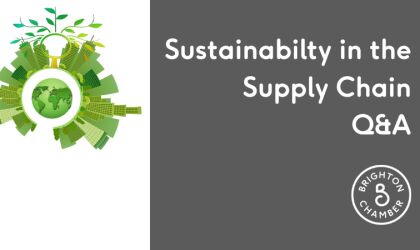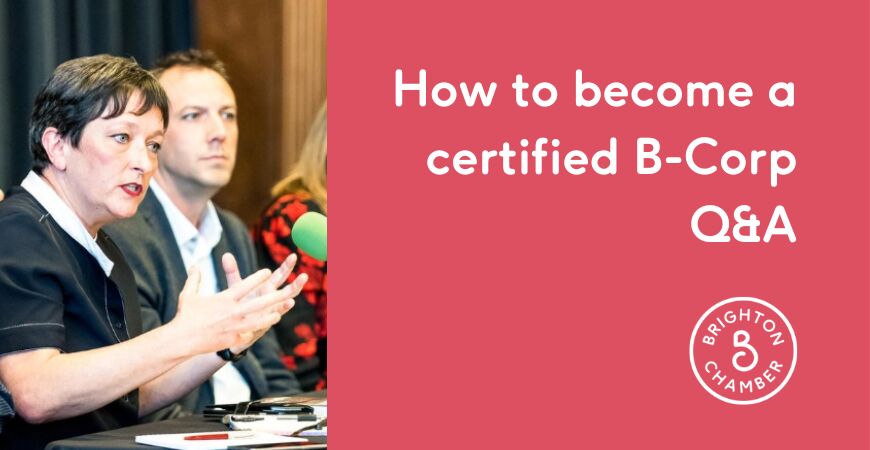

Wed 26 / 10 / 22
Q&A: How to become a certified B-Corp
Frank Hyde summarises our Q&A with Fiona Ras-Jones, Founder and Director of Make Impact, about the process of becoming a certified B-Corp.
By Frank Hyde of Brighton Chamber
What is B-Corp?
B-Corp is a certification which looks at the impact of a company across the entirety of the business, considering governance, staff, community, environment, and customers. But more than that, it’s a community and a movement.
It’s for people who believe that business should be a force for good, and want to see an economy that uses business as a force for good. As a certified B-Corp, businesses access a platform known as the B-Hive, working groups on a variety of key topics, regional groups called B-Locals, campaigns like Net Zero, and a multitude of other opportunities within the B-Corp network.
How do I get involved?
The first step is to go to the B Impact Assessment. This is a free-to-use digital tool which helps you to measure, manage, and improve the impact of your business, scoring points across the five areas mentioned above. As a prerequisite, it will ask you to change your legal governing documents to explicitly say that you consider the impact of your work on all of your stakeholders, not just your shareholders.
The assessment changes according to the company size, industry, and country, and you can pick and choose from the different sections where you get your points from. In order to get certified, you need to have 80 points – although it’s recommended to get to 85 before applying because your points might get bartered down along the way.
It is unlikely that a company will have enough points right off the bat, and it takes an average of a year and a half to reach the submission point, depending of course on your baseline score and how much you prioritise it.
Once you have your 85 points, you can press submit, and pay a submission fee of £250 + VAT. This puts you into an evaluation queue, and they make sure that you’re on the right track and set up correctly, before entering the verification process. At this point, you have to send evidence of up to 15 different areas of your work to demonstrate that you fulfil the points criteria; there are also broader checks which include a verification call and some background information. The waiting list for verification is around 8 months from the point of submission. Once you’re certified, there’s an annual fee that’s based on your company’s level of sales, and you have to recertify every three years.
Is it all automated and self-directed, or can I get assistance?
Up until you submit your assessment, you do have the option of doing it yourself – though support is available from B-Leaders. These are sustainability experts who have been trained to guide business through the certification process. All B-Leaders take a slightly different approach and have different industry specialisations and experience, so it’s worth finding the right person to guide you through your journey.
There are also instructions available for changing your governance documents and articles of association, with suggested text from B-Corp. Of course, you may want to hire a lawyer to help you understand the legal implications and make any additions that are relevant to your business.
Once you’ve submitted your assessment, you are assigned a standards analyst who is your main point of contact throughout the verification process. You will be asked to upload specific pieces of evidence, you don't need to have all of your proof uploaded before you submit.
Who can become a B-Corp?
Any profit-making business, from a sole trader to a multinational organisation and everything in between, can get this certification. You often hear of the ‘big names’ such as Ben and Jerry’s or The Body Shop, but in fact the highest scoring B-Corp in the UK is currently a company of three – which goes to show that anyone can do it. There are members from 158 industries internationally, including legal firms, lighting manufacturers, hospitality companies and property developers.
What are the benefits of becoming a B-Corp?
There’s a very common narrative that doing good just costs time and money, but that’s not the case. Larry Fink from Blackrock Investments believes that the next 1,000 unicorns will be green energy and carbon reducing companies. Currently, there are also more ESG-based funds available than there are regular funds.
People want to work for, buy from, and invest in companies that they believe in – studies have shown that people are four times more likely to buy from a company with purpose, and want brands to solve social and environmental problems. The B-Corp certification is a way to build trust and demonstrate credibility to customers and investors alike, especially in an age where green-washing is becoming more common. Of course, it takes effort to implement and embed within your business, but if you focus on building up your strategies from the beginning and are clear about what you aim to get out of it then you can leverage a lot of benefits. Commonly, these benefits include staff engagement, differentiation, and attracting new customers.
As well as all of the financial benefits though, becoming a B-Corp connects you to a community with a desire to create change for the better. It helps you understand, prove, and have a framework to improve your business. B-Corps help other B-Corps, and this opportunity for collaboration gives you access to a number of resources.
What are some of the common sticking points, and how can they be avoided?
One of the biggest challenges is making sure that everyone within the organisation is on board, and on the same page. Part of the process is embedding it throughout your business and all of your employees are a part of that.
There is also a lot of work involved in the process. It’s not intended to be something that you can approach half-heartedly, and it does take time and money. You have to really consider your priorities and what your staff and customers care about – and will engage with. It’s more than just looking at what would get you the most points, you have to mould it to your organisation and make it more of an inclusive and transformative process.
What approaches lead to a successful B-Corp?
There are some key actions you can take:
- Engage your staff
- Get everyone on board
- Understand what you want out of the process
- Speak to your stakeholders
- Prioritise actions that help you achieve your business goals and create the impact that you want to see
If you’re not sure how to start, you can access the online Knowledge Base which has examples and signposting to further support. You can also always ask for assistance from one of the B-Leaders, and choose a style that suits you. Some examples of approaches that B-Leaders may use include:
- A cohort approach, where you and a group of other businesses all log in online once a week and fill in the assessment simultaneously, with a B-Leader there for support
- One-to-one, where the B-Leader works with your business on an individual basis
- A strategic approach, where you focus on the governance section and building the vision, purpose and strategy
Another piece of advice is to engage with the community more broadly to get access to a wider range of benefits. B-Locals offer networking, socials, and partnerships. There’s shared learning, and the ability to speak to staff within other organisations and collaborate has led to some of the most successful B-Corps.
Are there alternatives if I’m not ready for B-Corp?
Even if you don’t feel ready to go for it, it's still worth taking the impact assessment. It’s free, and a great tool to understand and improve your impact and introduce you to the language used throughout the process.
In terms of alternatives, it depends what you’re looking to achieve:
- The Good Business Charter has a much narrower focus with only 10 areas
- The Social Enterprise Mark is good, but obviously only available to social enterprises
- The UK Responsible Business Standard is specifically aimed at small businesses but does not carry the same recognition as B Corp Certification.
Is there a B-Local in Sussex?
Apparently there is one in the works! The Chamber will make sure to keep everyone up to date with the local movement.
If you want to contribute to the Chamber blog, contact us on hannah@brightonchamber.co.uk



